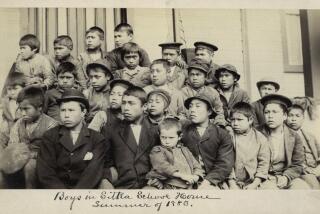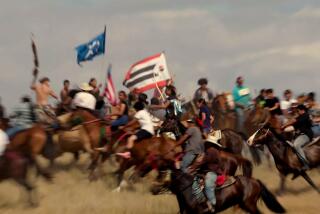Gary Rhine, 54; Made Films About Native Americans
- Share via
Gary Rhine, an activist whose award-winning documentaries focused on contemporary Native American struggles, died Monday in a single-engine plane crash in Lancaster. He was 54.
Rhine, who was also a flight instructor, was killed when the Cirrus SR20 aircraft he and a student were flying crashed into a field near Gen. William J. Fox Airfield. Both men died upon impact, officials said. The identity of the other man has not been released.
The incident is being investigated by the National Transportation Safety Board.
After a trip to Israel, the Jewish filmmaker was inspired to focus on the plight of Native Americans.
“He really felt what he called the ‘American holocaust’ had not been documented at all,” said his wife, Irene Romero.
In his first film, “Wiping the Tears of Seven Generations,” Rhine used the 100th anniversary of the Wounded Knee massacre in 1990 to tell the story of the Sioux Nation’s loss.
The Times’ review called the 1992 film “moving” and “an effective consciousness-raiser.”
“The Peyote Road” protested the 1990 U.S. Supreme Court decision that denied 1st Amendment protection to the sacramental use of peyote by Native Americans in ceremonies “that predate the Constitution by at least a millennium,” The Times’ 1994 review noted.
In “The Red Road to Sobriety” (1995), Rhine took viewers to the first Native American Alcoholics Anonymous convention as he wove a story that showed “how alcohol was used as a tool to annihilate tribes,” his wife said.
Rhine’s documentaries consistently won awards at regional and international festivals, including the American Indian Festival.
His Los Angeles-based production company was called Kifaru -- Swahili for “rhinoceros” -- because “Rhino” had been his nickname since he was a boy.
Gary Sherwood Rhine, a fifth-generation San Franciscan, was born June 26, 1951, to Gerard, who owned a chain of tire companies, and Sherlee. His mother runs a salon and day spa in San Francisco.
After a year at the University of Oregon, Rhine left to join several hundred hippies who headed to Tennessee in 1970 to found the commune known as The Farm. He lived there for 13 years.
While in Tennessee, his interest in Native American issues was sparked when he met members of the Iroquois confederacy. Later, he lived on the St. Regis Mohawk reservation in New York.
Trained as a paramedic, Rhine called himself “the butler for midwives” as he taught Native American communities about midwifery, his wife said.
“He was just one of those rare people who always walked his talk,” Romero said. “And he told a mean joke.”
A memorial service will be held at 1:30 p.m. Sunday at Congregation Beth Israel-Judea, 625 Brotherhood Way, San Francisco. A service in Los Angeles is being planned.
In addition to his wife and mother, Rhine is survived by three daughters, three stepsons, a brother and a sister.
More to Read
Sign up for Essential California
The most important California stories and recommendations in your inbox every morning.
You may occasionally receive promotional content from the Los Angeles Times.










